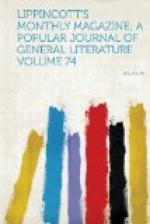sympathy, perhaps. At any rate, they were soon
teaching him their mode of using the most picturesquely
murderous of all weapons, and Black Eagle offered,
through the interpreter, to give him a mustang and
a fine wolf-skin. The pony was declined, the
skin accepted, a
quid pro quo being bestowed
on the chief in the shape of one of Mr. Ramsay’s
breech-loaders, a gift that made the snake eyes glitter.
But what earthly return can be made for some friendly
offices? Could a thousand guns be considered as
an adequate payment for the delirious thrill that
Mr. Ramsay felt when he shot an arrow straight through
the neck of a big buffalo, and, wheeling, galloped
madly away, like the hero of one of his favorite stories?
Was not the duke, who “knew a thing or two about
shooting” and had hunted the noble bison in
Lithuania, almost as much delighted as though he had
done it himself? Is it any wonder that these intoxicating
pleasures were all-sufficient for the time to Mr.
Ramsay? Perhaps Thekla would have been forgotten
by her Max, and Romeo would never have sighed and died
for love of Juliet, if those interesting lovers had
ceased from wooing and gone a-hunting of the buffalo
instead. Not the most deadly and cruel pangs
of the most unfortunate attachment could have taken
away all the zest from such an occupation, provided
they had had what the Mexican journals call the “
corazon
de los sportsmans.” Youth, strength,
courage, skill, exercised in a vagabondage that has
all the nomadic charm without any of its drawbacks,
are apt to sponge the old figures off the slate of
life, leaving a teary smear, perhaps, to show where
they have been, and room for fresh problems. At
night over the camp-fire Mr. Ramsay gave a few pensive
thoughts to the girl who regularly put two handkerchiefs
under her pillow to receive the tears that welled out
copiously when she was at last alone and unobserved
after a day of virtuous hypocrisy. Poor child!
The pain was very real, and the tears were bitter
and salty enough, though they were to be dried in due
time. If he had known of them, perhaps he might
have kept awake a little longer; but when he wasn’t
sleepy he was hungry, and when he wasn’t hungry
he was tired, and when he wasn’t tired he was
too actively employed to think of anything but the
business in hand. Happily, at five-and-twenty
it is perfectly possible to postpone being miserable
until a more convenient season; and, though he would
have denied it emphatically afterward, he certainly
thought only occasionally of Bijou at this period,
and of Ethel not at all.
Miss Noel heard very regularly from Mrs. Sykes all
this while; and that energetic traveller had not been
idle. She had made her new friends “take
her about tremendously,” she said. She had
seen all the large towns in that part of the country,
and thought them “very ugly and monotonously
commonplace, but prosperous-looking,—like
the inhabitants.” The scenery she had found
“far too uninteresting to repay the bother of
sketching it.” But she had made a few pictures
of “the views most cracked up in the White Mountains,”—where
she had been,—“a sort of second-hand
Switzerland of a place; really nothing after the Himalayas,
but made a great fuss over by the Americans.”
She described with withering scorn a drive she took
there.




